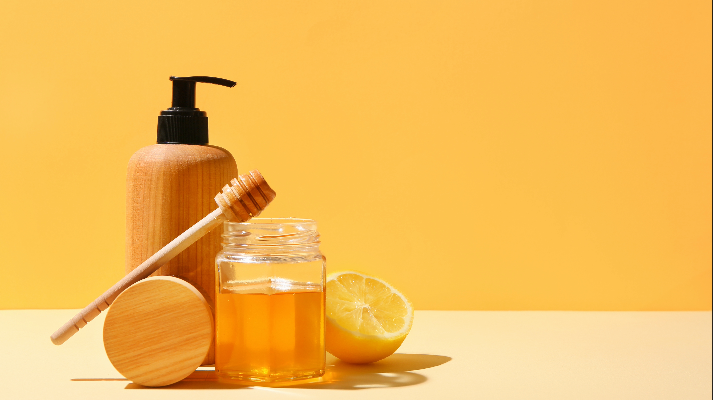What are the benefits of honey for the skin?
Why do we find it in most cosmetics and even the soap used to wash the face?
Does it really maintain the freshness of the face and eliminate some skin problems such as acne?
Many questions that need a correct, detailed answer.
Therefore, in this guide, let us share with you the most important scientifically proven benefits of honey, and its effect on the skin.
But first, let's answer honestly...
Is honey good for the skin?
Yes, honey is beneficial for the skin, as has been proven by several scientific studies that have been conducted.
For example...
In research published in 2016 at the National Center for Bioinformatics, honey was indicated as a substance rich in antioxidants and anti-inflammatory substances that help in regenerating the layers of the skin in cases of burns, in addition to activating the skin’s immune response.
In other research , we find talk about honey - specifically Manuka honey - which contains Methylglyoxal as one of the most important natural substances for treating problems such as tinea, psoriasis, dandruff, anal fissures and others...
Some studies also talk about honey as a substance that helps cells regenerate faster.
So it can be said that honey actually has some benefits for the skin, which you can benefit from.
Benefits of honey for the skin
There are many benefits that you may find exaggerated, and many benefits that are already scientifically proven.
In this guide, our full focus is on those that have been proven by scientific evidence, studies and experiments.
But first, it is important to know that all the benefits that we will talk about below are mainly due to the antibacterial and anti-inflammatory properties that honey provides.
In addition to being rich in antioxidants, enzymes and minerals.
Start now with...
1- Honey to treat acne
Acne is one of the most important skin problems that occurs as a result of inflammation of the skin caused by bacteria.
Fortunately, honey, especially unpasteurized or raw honey, contains antibacterial and antimicrobial properties, which can improve skin health.
Some simple studies also indicate its role in improving the immune system's response to bacterial infections of the face.
Another study of a mixture of honey and glycerin indicated that this mixture may be more effective than antibacterial sulfur soap.
So yes, raw honey can be used to fight bacterial infections on the face, and then reduce its symptoms, which are acne.
Just target the areas that suffer from acne with honey, leave it for a few minutes, then clean it well.
2- Honey to lighten and freshen the skin
This benefit does not depend on many studies, but rather on one property that honey provides, which is exfoliation.
Honey is a natural exfoliant that helps remove dead skin from the face.
Once this happens, honey contributes to lightening the skin and making it appear more radiant.
The most important thing here is to use natural raw honey.
You can also add another natural exfoliant, such as coffee or cinnamon.
3- Honey for wounds and their effects
The ancient Egyptians, Chinese, Greeks and other ancient civilizations already relied on honey as a natural ingredient applied to wounds.
In recent times, scientific experiments and studies have actually begun to prove this.
However, it is important to keep in mind that honey may contain some bacteria that may be transferred to the wound, so it is recommended when using honey for medical purposes to sterilize it first in ways that the average individual cannot do.
Therefore, here we are talking about scientific information that can only be applied in extreme circumstances.
In one study, honey was mentioned as one of the natural ingredients that may help treat wounds and speed up the healing process.
The study also mentioned the ability of honey to prevent the growth of bacteria and microbes.
As for the effects of wounds or acne, some have already shared their experience of using honey topically on the effects of wounds day after day and have actually noticed that these effects have improved or disappeared.
4- Resists the signs of aging
Signs of aging occur when harmful molecules begin to attack, affect or destroy cells.
As we already mentioned in the introduction to this article, honey contains a huge amount of antioxidants, whose primary role is to protect cells from these harmful molecules.
So...
Honey can help reduce and delay signs of skin aging such as wrinkles.
Here you can get the benefits of honey for the skin by eating it in meals or drinks, or using it as a mask with other natural ingredients.
5- It may play a role in treating skin cancer
Perhaps this benefit is a bit strange, but in recent studies honey has been indicated as one of the substances that may have a good effect towards skin cancer.
The study indicated that there is some evidence that suggests that honey can slow the growth rate of cancer cells.
In another study, honey was also indicated as a substance that can help treat various types of cancer, due to the presence of a good amount of antioxidants in it.
Despite these studies, you certainly cannot rely on honey for a medical condition such as skin cancer.
We strongly advise you to go to the doctor and consult him to take all necessary measures.
6- Honey to treat eczema
Have you ever suffered from eczema before?
Eczema is a medical condition that causes skin irritation, redness, itching and pain.
Although it is more common in young people, it can also affect adults.
There aren't a lot of studies here, just a small study involving 14 people , which points to Manuka honey as a substance that reduces eczema symptoms.
Another study points to Kanuka honey as a substance that contributes to reducing the effects of eczema , but it was also a small study with only 15 people.
Therefore, I think we need more studies on honey and eczema in order to confirm this benefit.
7- Honey to treat psoriasis
Psoriasis is one of the most common autoimmune symptoms that primarily appears on the face.
Here the skin grows excessively, causing itching and inflammation of the skin.
Few studies indicate the role of honey in treating psoriasis, but since some studies already exist, we must consider this as one of the benefits of honey for the skin.
In a small study to clarify the effect of Kanuka honey on psoriasis , the results were similar to the effect of honey and the topical cream used by the other group in the trial.
The challenge in these studies, which does not make this information confirmed, is the small number of participants in these experiments.
Therefore, we need more experiments to confirm the benefits of honey for the skin, specifically in medical uses.
Now let's move on to find out...
How to use honey for the skin?
Before using honey, it is important to do a skin allergy test for honey.
In this way, we ensure that no skin infections or irritation occur as a result of the honey or pollen it may contain.
A small dot of honey, put on the hand and massage, then leave for 20 minutes. If any redness occurs, you are suffering from an allergy and you should not put honey on your face or any part of your skin.
There are two ways in which you can use honey for the skin:
- Use honey directly on the skin or on the part you want to treat.
- Mixing honey with other ingredients to make a cream or mask.
Whether you decide to use honey alone, or with another ingredient...
Before anything, it is important to wash your face well with soap and water, or you can use a lotion.
After that, leave the mixture on your face for a few minutes, then wash it well.
Many studies indicate that the best honey to use is natural, raw honey. Some suggest this is because it contains an additional ingredient, which is pollen, which one recent study indicated is able to reduce the feeling of pain and has antibacterial and antimicrobial properties that affect the skin.
- The most famous honey mask for the skin:
The honey and lemon mask is one of the very famous masks as one of the distinctive and beneficial natural mixtures for the skin.
Lemon is a substance rich in vitamin C, which we have noticed exaggerated spread in cosmetic products recently.
We now have vitamin C lotion and serum for the skin.
The secret is that it is a powerful antioxidant that protects the skin from damage due to sunlight and other environmental factors.
By mixing it with honey, which is considered an antioxidant, antibacterial, antifungal, and also a skin moisturizer, we can obtain huge benefits that help maintain and protect the health of the skin.
You can prepare this mask simply by:
- 2 to 3 tablespoons of raw honey.
- Two drops of lemon oil or some lemon juice.
- Apply it on the skin for 15 minutes.
- Clean it well.
But you should know that this mask may cause some pain in the wound areas, due to the fact that lemon contains citric acid.
Harmful effects of honey on the skin
In general, there is no harm from using honey for the skin.
But the problem is always that you have some kind of allergy to honey or one of the ingredients it may contain, such as pollen.
In this case, honey may cause skin irritation and inflammation.
Therefore, we always recommend avoiding using honey in this case.
But you may not know whether you suffer from any type of allergy or not!!!
In this case, it is always preferable to do a simple allergy test on a part of the skin of the hand to find out whether any response will occur or not.
Another note that you should pay attention to: it is necessary to get rid of the remaining honey on your skin after use.
If you sleep with honey residue on your face without cleaning it well, this may cause more skin problems.
Thus, you have learned about the benefits of honey for the skin, how to use it, and the precautions that must be taken.
If you have any questions regarding this matter, all you have to do is leave your comment or contact us.

